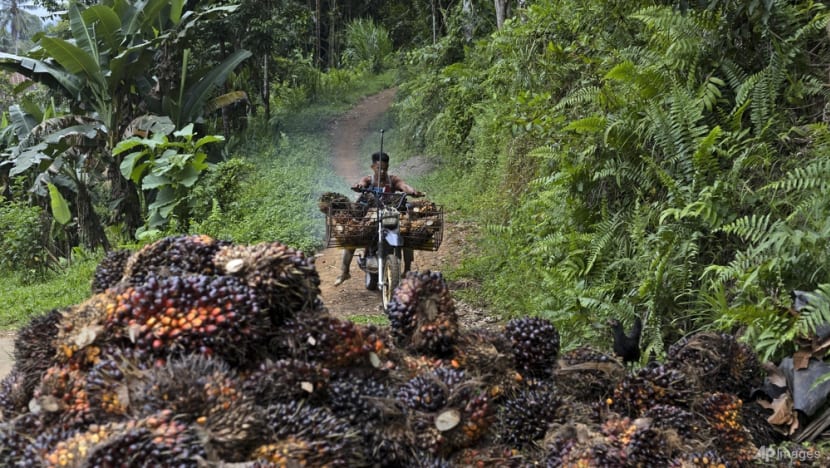'Blessing in disguise': Indonesia's president-elect Prabowo says EU palm oil ban will benefit his country
Indonesia will use more of the palm oil it produces for biodiesel and reduce its dependence on fuel imports, the incoming president says.


This audio is generated by an AI tool.
JAKARTA: The European Union's anticipated import curbs on Indonesian palm oil are a "blessing in disguise" that will help the Southeast Asian country improve its energy self-sufficiency, president-elect Prabowo Subianto said.
Indonesia will, instead, use more of the palm oil it produces for biodiesel and reduce its dependence on fuel imports, Mr Prabowo said.
The incoming Indonesian president, who will take over from Mr Joko Widodo on Oct 20, revealed on Sunday (Aug 25) what he had said to French president Emmanuel Macron when they met in Paris in late July.
"If you want to ban our palm oil from entering Europe, I say thank you very much. We will use our palm oil for the benefit of our people, achieving self-sufficiency in energy," said Mr Prabowo as quoted by local media outlet Bisnis.
"We feel that if Europe does not want to buy our palm oil, we are grateful, it's a blessing in disguise. He (Mr Macron) was a bit surprised," he added.
They had discussed what he called the EU’s policy to boycott Indonesian palm oil, and Mr Macron reportedly offered assistance to mitigate the impact of the boycott on Indonesia, Mr Prabowo recounted at the congress of the National Mandate Party (PAN), which is part of his political coalition.
He was referring to the EU’s anti-deforestation regulation, which will take effect on Dec 30 and require assessments of seven commodities including palm oil. Products should be deforestation-free and traceable, among other criteria. Indonesia and Malaysia, the world's two largest palm oil producers, have decried the policy as discriminatory.
In February, Indonesian deputy minister of trade Jerry Sambuaga told Antara news agency that the primary motivation behind the EU's policy was the loss in trade competitiveness. He noted that the EU's domestic rapeseed oil is considerably more expensive than Indonesian palm oil.
Indonesia has lodged an official complaint against the EU with the World Trade Organization (WTO) in a case that remains unresolved.
Mr Prabowo said on Sunday that he declined France’s offer and instead welcomed the EU's stance.
Allegations of palm oil-linked deforestation are baseless and part of a broader smear campaign against the country, claimed Mr Prabowo, as reported by news outlet Detik.
"They boycotted us and said that we were destroying the forest … they are the ones who (came to Indonesia) and destroyed the forest, but we are to be blamed," Mr Prabowo said, alluding to various European countries’ history of colonisation in Southeast Asia.
Research by France-based tech consultancy TheTreeMap using satellite imagery has, however, shown that some forests lost in Indonesia since 2001 were converted to oil palm plantations. The rate of deforestation has slowed since 2012, but increased slightly in 2022 and 2023, its analysis found.
INDONESIA’S BIODIESEL STRATEGY UNDER PRABOWO
Last week, Mr Prabowo outlined a strategy to harness palm oil for the country's energy needs. He hopes to implement Biodiesel 50 (B50) – a 50-per-cent palm oil-based biodiesel blend by early next year, which he said would cut Indonesia’s oil imports by US$20 billion per year.
"Soon, we will no longer need to import diesel. Our diesel will come from palm oil, known as biodiesel. Currently, we are at B35, but we will push to B40 and eventually B50. Achieving B50 will enable us to save US$20 billion," said Mr Prabowo as quoted by Detik.
Research by academics at the Bandung Institute of Technology (ITB) has also shown that Indonesia could soon produce gasoline from palm oil, he added.
During his February presidential campaign, Mr Prabowo had pledged to establish an Indonesian Palm Oil Agency, streamlining the current system where three institutions oversee the country's palm oil sector: the Indonesian Palm Oil Council (DMSI), the Palm Oil Plantation Fund Management Agency (BPDPKS) and the Indonesia Sustainable Palm Oil (ISPO) Secretariat, which comprises representatives from various ministries and agencies.
The lack of coordination among key players is hampering the development of Indonesia’s domestic palm oil industry, Mr Tungkot Sipayung, executive director of the Palm Oil Agribusiness Strategic Institute (PASPI), told CNBC Indonesia in June.
"There are 17 ministries that regulate palm oil policies, with 34 different laws," said Mr Tungkot, adding that there is a need for a dedicated agency to ensure policy coordination in the sector.















